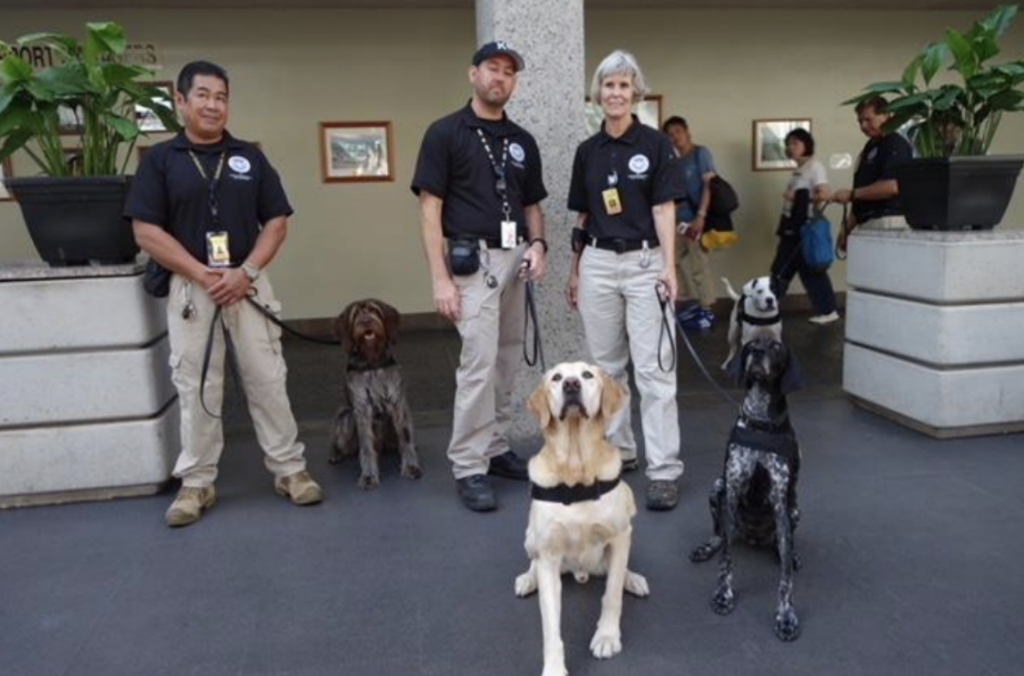TSA Highlights Canines Role at HNL
Officials with the Transportation Security Administration (TSA) on Wednesday, Sept. 19, 2018, highlighted its Passenger Screening Canines (PSCs), a key asset used to enhance security and keep passengers safe and secure when departing Daniel K. Inouye International Airport (HNL) in Honolulu.

Some of TSA’s Passenger Screening Canines and their handlers who
work at HNL. These highly-skilled dogs are trained to detect explosives
and explosive materials in a busy transportation environment. PC: TSA
PSCs are trained to detect explosives and explosive materials in a busy transportation environment. They work with a handler searching travelers and their belongings in the security checkpoint and assist with the efficiency and effectiveness of TSA’s screening operations.
“PSCs and their handlers are valuable members of our local TSA security team,” said TSA Federal Security Director for Hawai‘i Jenel Cline. “TSA’s use of these specially-trained canines is an important additional layer of security at HNL.”
“Safety is our top priority and we are continuously in communication with our federal partners to ensure the traveling public is protected,” said Director Jade Butay, Hawai‘i Department of Transportation. “We are grateful to have the TSA canines at HNL as one of the safety features in our airport security plan.”
Passengers departing HNL can at any time expect to see PSC teams working in the security checkpoint. The teams are able to navigate among large groups of people to pinpoint the source of an explosive odor, even if the source is mobile and often without the source being aware it is being tracked. A PSC handler is trained to read its dog’s change of behavior when it indicates an explosive scent has been detected.
If a dog alerts its handler to the presence of explosive odor, TSA follows an established procedure to resolve the alarm. The use of these highly-trained canines is an effective tool in deterring and detecting the introduction of explosive devices into the nation’s transportation systems. Because explosives are known to be the greatest threat to the aviation system, PSCs are regularly tested to ensure they maintain a high standard of operational effectiveness. This continual training allows for all team to be a reliable resource in detecting an explosive threat, maintaining proper acclimation within the airport and mitigating potential distraction in a busy transportation environment.
Currently, TSA has more than 320 PSC teams who work primarily at airports across the country. These teams are also trained to work in non-aviation transportation venues. While PSCs are sociable, they are working dog and they should not be petted or fed by anyone except their handlers.
Profiles of some of TSA’s working canines supporting security operations at Daniel K. Inouye International Airport (HNL):
- King is an eight-year old Yellow Labrador Retriever. He and his handler Lance have been together for five years and can usually be seen working at Daniel K. Inouye International Airport (HNL). Team King has traveled to support high profile events such as a Presidential Inauguration, Super Bowl 50 and the 2018 NCAA Final Four. When off-duty, King lives at home with his handler and enjoys swimming at the beach, sleeping on the couch and, of course, eating.
- Rea, a soon to be five-year old black-and-white German Shorthair Pointer joined the TSA K9 Team at HNL in March 2016. Rea is a great traveler and has supported such events as the most recent Presidential Inauguration and the 2018 College Final Four Basketball tournament in San Antonio, Texas. Rea loves a long run with her handler Kathy who joined TSA in 2002. Kathy has been with the TSA canine program since 2008.
- Duke is a three-year-old German Shorthaired Pointer and loves working with his handler Chuck. They have been a team since February 2018. Duke is very enthusiastic and loves to come to work. In fact, once he arrives at the “office,” he never stops working until he is put back in the truck to go home. You will undoubtedly remember Duke’s face – he has a distinctive black fur patch around his left eye, making his appearance very unique. Duke is adapting well to living in a big house with a yard to play in. He shares it nicely with his roommate Rottweiler D-1.
- Kajla, aka “Bugs,” is a three-year-old Vizsla handled by Transportation Security Specialist Penny. These two have been paired together for almost two years and proudly serve HNL. Kajla is a spirited, fun-loving, powerhouse pup that is constantly on the move and driven to carry-out TSA’s important mission. Team Kajla has supported multiple special assignments and is an anchor team here at HNL when other canine teams deploy to support other big events.
- Brute is a four-year-old German Wirehair Pointer. Brute is partnered with his handler Jerry. Brute is an unusual breed in Hawai‘i and his uniqueness is often the topic of conversations with departing passengers. He loves working around people and is a gentle giant. On his off days, he can often be spotted at the many surf breaks relaxing on the beach, swimming, or surfing.










